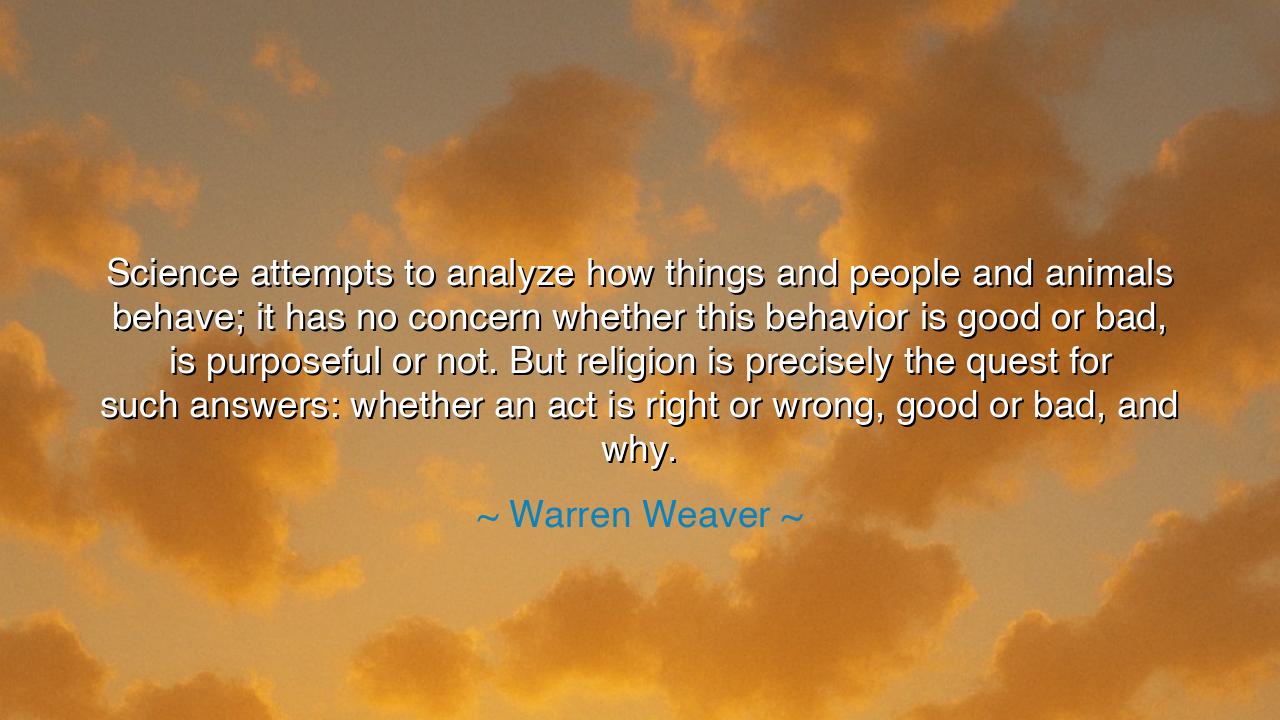
Science attempts to analyze how things and people and animals
Science attempts to analyze how things and people and animals behave; it has no concern whether this behavior is good or bad, is purposeful or not. But religion is precisely the quest for such answers: whether an act is right or wrong, good or bad, and why.






In the grand symphony of human existence, there are two great forces that guide our understanding of the world: science and religion. These forces, while often seen as separate, each attempt to answer profound questions about the nature of life. Warren Weaver, in his insightful words, highlights this distinction: "Science attempts to analyze how things and people and animals behave; it has no concern whether this behavior is good or bad, is purposeful or not. But religion is precisely the quest for such answers: whether an act is right or wrong, good or bad, and why." This observation invites us to reflect on the fundamental difference between science and religion—one seeks to understand how the world works, while the other seeks to understand why we act the way we do, and whether those actions align with higher moral truths.
Science, from its earliest origins in the thoughts of Aristotle and the observations of the ancient Greeks, has sought to categorize, analyze, and predict the behavior of the world around us. The great minds of Galileo, Newton, and Darwin did not concern themselves with whether the phenomena they observed were moral or immoral; their goal was to uncover the laws of nature. Newton’s laws of motion, for example, tell us how objects move, but they do not tell us whether the movement is good or bad. This dispassionate pursuit of knowledge is what sets science apart from the realms of philosophy and religion, which grapple with deeper questions of purpose and morality.
In contrast, religion has always been concerned with the moral dimensions of human existence. The ancient Egyptians, with their gods and rituals, sought to understand not only the forces of nature but the cosmic order that governed the balance between good and evil. The Ten Commandments, handed down by Moses in the Bible, provide a clear guide to moral behavior, dictating what is right and what is wrong. In Hinduism, the concept of dharma—righteous duty—is woven into the fabric of existence, asking not only how one should act but why one should act in accordance with the universal moral order. This quest for moral truth is what separates religion from science, as religion does not merely seek to understand how we behave, but why certain behaviors are deemed good and others bad.
The ancient philosophers often wrestled with the relationship between science and religion. Socrates, for example, used reasoning to question the moral practices of his time, seeking to understand the nature of virtue and the best way for a person to live. Yet, his teachings were not just about intellectual pursuits but about the moral duty one had to oneself and to society. He believed that a true philosopher must ask not only what happens in the world but also why things happen, and whether those things are just. Plato, his student, took this further in his dialogues, where he explored the nature of justice, the soul, and the ultimate purpose of life—questions that science could not answer, but that religion and philosophy sought to address.
Consider the story of Gandhi, who famously stated, "You must be the change you wish to see in the world." Gandhi’s life was a reflection of the moral principles he upheld, rooted deeply in his faith and his belief in the moral law of nonviolence (ahimsa). His actions were not dictated by any scientific formula, but by his religious beliefs about what was right and just. He sought to change not just the social structures of India but the hearts of its people, urging them to live in accordance with higher moral truths. Gandhi’s life serves as a powerful example of how religion, when it informs our choices, calls us to not only understand the world but to transform it according to principles of compassion, justice, and truth.
Weaver’s distinction between science and religion offers us a profound lesson about the role of each in shaping human existence. Science provides us with the tools to understand the physical world, but it is religion that offers the moral framework by which we evaluate our actions and determine what is good and evil. Science tells us how things work, but religion asks us why things should work in a certain way. Both are vital, but each serves a different purpose in our lives. It is through the marriage of reason and faith, understanding and moral direction, that we are able to lead lives of purpose and meaning.
In our daily lives, we must heed the wisdom of Warren Weaver's words and recognize the different roles that science and religion play in our journey. As we navigate the complexities of the world, let us seek knowledge and understanding from science, but let us also turn to religion to guide our choices, to help us discern the moral path in the face of uncertainty. Let us not forget that while science can illuminate the world around us, religion is the light that illuminates the path ahead, helping us understand why we should walk it with integrity and purpose. In this balance, we find the strength to live with wisdom, to act with moral courage, and to navigate the complexities of life with both knowledge and compassion.






AAdministratorAdministrator
Welcome, honored guests. Please leave a comment, we will respond soon